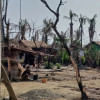A friend in need is a friend indeed
Two years ago, Bangladesh felt a "strengthened bond" with India that "would benefit people of the two countries as well as of the region" when Indian Prime Minister Narendra Modi flew into Dhaka. A year later, Dhaka found a "new strategic partner" in Beijing when Chinese President Xi Jinping landed at Shahjalal International Airport.
But another two years down the line, Bangladesh had a new dawn of realisation -- that in the world of diplomacy and geo-political exigency these words may not mean much -- evident in the hundreds of thousands of Rohingyas streaming into Teknaf in the face of unimaginable ruthlessness of Myanmar.
For many in Dhaka it was a shock when Modi during his trip to Myanmar did not utter a single word about the plight of the Rohingyas, and China's silence was a pain.
They thought at the present level of relationship with India, Bangladesh should have been a priority than a faraway country like Myanmar. Many thought because of the economic relationship, Bangladesh at least deserved some sympathy from China. But that was not to be.
As the Indian Express maintained in its September 7 report titled "India adrift on its Myanmar policy", 'the Chinese have a better appreciation of what the ground situation is in Myanmar'. It juxtaposed the joint statement by India and Myanmar on September 6 and the Chinese foreign ministry's statement on August 31.
The joint statement said: "India condemned the recent terrorist attacks in northern Rakhine State, wherein several members of the Myanmar security forces lost their lives".
On the other hand, the Chinese statement said "we want to express our condolences to the innocent victims and sympathies to the innocent injured and the bereaved families. As a friendly neighbour, China supports Myanmar's efforts in maintaining peace and stability in the Rakhine State and sincerely wishes that Myanmar could maintain social stability, ethnic solidarity and economic development".
The Pennsylvania-based Foreign Policy Research Institute (FPRI) has explained Modi's shyness to criticise Myanmar as "a careful calculation of India's perceived national security interests".
Indian Express explains India's concerns about the remnants of ULFA who may be reinvigorated by the new cold relation with China. India is also worried about the National Socialist Council of Nagaland manned mainly with Burmese Nagas.
FPRI also traces India's interest in limiting the influence of China. In earlier times, Aung San Suu Kyi and her democracy-loving people were flung against the junta that was supported by China. India had taken the side of Suu Kyi.
"However, after watching the PRC (China) make steady inroads into Myanmar in the early 1990s, India started to move away from its unstinted support for democratic reforms. Modi's muted reaction to the ongoing crisis amounts to a logical culmination of that strategy," FPRI noted.
Express has outlined India's main economic and strategic concerns in Myanmar as that of the Kaladan multimodal transport project and the Special Economic Zone in Sittwe.
"Both are in Rakhine state. In the meantime, the Chinese will in all probability get the 80 percent investment in Sittwe port. Sittwe is also the main gas pipeline gateway to Yunnan and beyond," express has written.
But beyond regional concerns, there seem to be domestic exigencies for India as well.
"The BJP regime, as is well known, has little or no regard for India's vast Muslim minority," the FPRI has pointed out. Consequently, it should come as little surprise that the regime has no particular regard for the Rohingyas who have sought refuge within India."
When emboldened by the two regional superpowers' posturing on the Rohingya issue, an undeterred Myanmar can go ahead in its purge on the Rohingyas. This is why the Myanmar army's commander in chief General Min Aung Hiling can describe the ongoing crackdown against the Rohingya as "unfinished business" dating back to World War II, as reported in the Wall Street Journal.
Now that Myanmar has won a diplomatic walkover after the Rakhine State has almost been emptied of its Rohingya population, the Myanmar general now wants imposition of martial law in the Rakhine State and asked its 'people' to reunite against the Rohingya.
Before Bangladesh, there remains only one option open– to go all out on a diplomatic offensive to force Myanmar to take back its citizens. It has to make India and China understand that an uprooted Rohingya population in Bangladesh does not bode well for anybody's security concerns if that is the prime reason for India or China to turn a blind eye to the situation.
In its armoury, Bangladesh has a lot of weapons to launch diplomatic offensive. It has been chronicled in numerous documents that Rohingyas have systematically been subjected to cleansing. All it needs is to use the diplomatic armoury and pursue its friends to stand beside humanity.

 For all latest news, follow The Daily Star's Google News channel.
For all latest news, follow The Daily Star's Google News channel. 








Comments